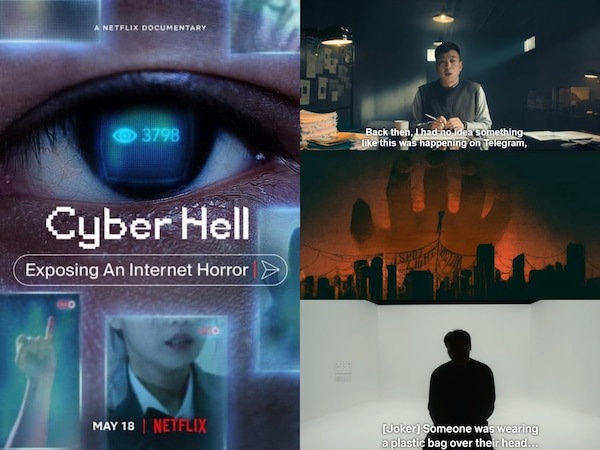'Cyber Hell: Exposing an Internet Horror' review: A slick take on a deeply disturbing case that refrains from digging deeper
The riveting and disturbing tale of internet sex crime organizations is now premiering on Netflix.

Last Updated: 01.56 PM, May 19, 2022
Story:
A couple of years ago, anonymous and highly exploitative chat rooms on the messaging service Telegram emerged in South Korea, rampant with sex crimes against underage girls. When a group of journalists and news professionals, in coalition with Seoul's police force, tries to get to the bottom of this evil nexus, they unravel the darkest underbelly of internet crime that is governed by the most unassuming folks.
Review:
A documentary film, more often than not, works as an exploration of curiosities. Regardless of the subject matter, there is an underlying perspective of the maker, guided by the same curiosity, that ultimately sets its narrative apart from its counterparts. And when it comes to a true event so high-profile that it flustered an entire nation in one big sweep, the perspective becomes paramount for there lies a huge responsibility to tell the story with the ideal blend of objectivity and empathy.
At the very outset, Cyber Hell: Exposing of an Internet Horror is quite true to its title. The latest true-crime offering of Netflix is molded mainly as an exposé that digs deep into the underbelly of a massive digital sex crime syndicate in South Korea. The emergence of stealthy messaging services like Telegram triggered a vast nexus of sex trafficking a couple of years ago wherein small organizations, that mostly appeared in the form of "chat rooms" on Telegram, leveraged highly sensitive and intimate material of young girls and distributed them among paid users for years together. When a group of journalists is made privy to this hidden dark and disturbing world of the internet by whistle-blowers, it discovers that things have spiraled out of control a long time ago.
Much of Cyber Hell is through the eyes of those who worked the case. The story begins with journo Kim Wan who is tipped off by a former chat room member about a nefarious crime syndicate that essentially deals with child pornography and sex slavery. How does this operate? Wan realizes that Telegram's encrypted platform allows users and perpetrators to remain anonymous and carry out the activity without any scrutiny. He understands that things are far more sinister than meets the eye, for the chat rooms have now become agencies to blackmail and coerce underage girls into sharing their most intimate videos and pictures - soon, a task force comprising Wan, fellow journalists, newsroom professionals, and the police force, discovers that the operation is governed mainly by two mysterious individuals named Baksa (translating to 'Doctor' in English) and GodGod.
It is here that Cyber Hell becomes a starkly interesting watch. Director Choi Jin-Sung, known for his 2017 documentary The Reservoir Game, is clear and precise with his narrative and there is a slick, polished tone to the film that gets the ball rolling without any delay. Having established the premise through Kim Wan & Co., the film relentlessly pursues the case with a sense of objectivity, thus allowing the viewer to be slowly drawn into understanding the evil better and also subconsciously develop empathy for the victims. The smooth VFX work renders a tasteful interpretation of the digital world and the onus lies mostly on the makers to simplify the workings of internet crime for the viewer. Baksa and Godgod, as evidenced by the task force, are likely to be unassuming members of the society, and the film is successful in highlighting the ease and efficiency with which one can commit a "digital crime". Interestingly, much like the 2003 South Korean masterpiece Memories of Murder, Cyber Hell too casts an indirect focus on the perpetrators by carefully piecing together the evidence laid out by the workers of the case and Choi Jin-Sung, in the interest of the victims' safety, also recreates most scenarios through actors so as to, in turn, create a visual retelling of the true event. The narrative soon becomes a cat-and-mouse chase for Baksa and GodGod that brims with many twists and edge-of-the-seat moments.
That said, Cyber Hell is also made for a simple watch. In an attempt to turn the maniacal sequence of events into a palatable watch, the makers end up leaving their audience with a sense of detachment. The story that takes place is originally narrated in Korean by its characters but the Netflix release has a queer English overdub, to suggest that the film could be experienced amid all the everyday distractions. As much as the film focuses on the sex crime organizations, it fails to duly understand the minds of those running them and how, despite being the most "normal" individuals, Baksa and GodGod are lured into the world of crime, power, and evil. In an unflattering attempt to spare some runtime for the victims, the film somewhat foregoes its main intent to unravel the mystery with complete objectivity.
Verdict:
Cyber Hell: Exposing an Internet Horror is an effective telling of a rather important and undiscovered phenomenon of a digital sex crime. Through the garb of a well-executed investigation, the film enunciates what it takes to grow in stature as an internet perpetrator and how the whole medium renders gullible people an unsafe environment. Choi Jin-Sung and his team also allude to the fact that this wouldn't be the only instance of evil, and that each country and culture is likely to have its own version of it growing underneath. Despite the few shortcomings, such as the murky perspective towards the end, the film does make for a riveting watch that promises chills all along.
WHERE
TO WATCH
Subscribe to our newsletter for top content, delivered fast.

